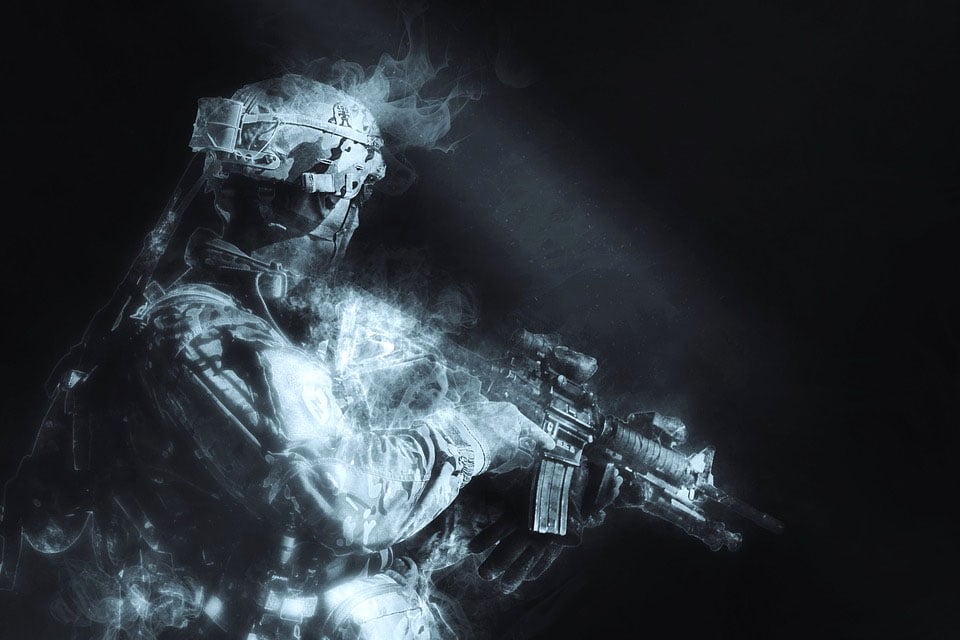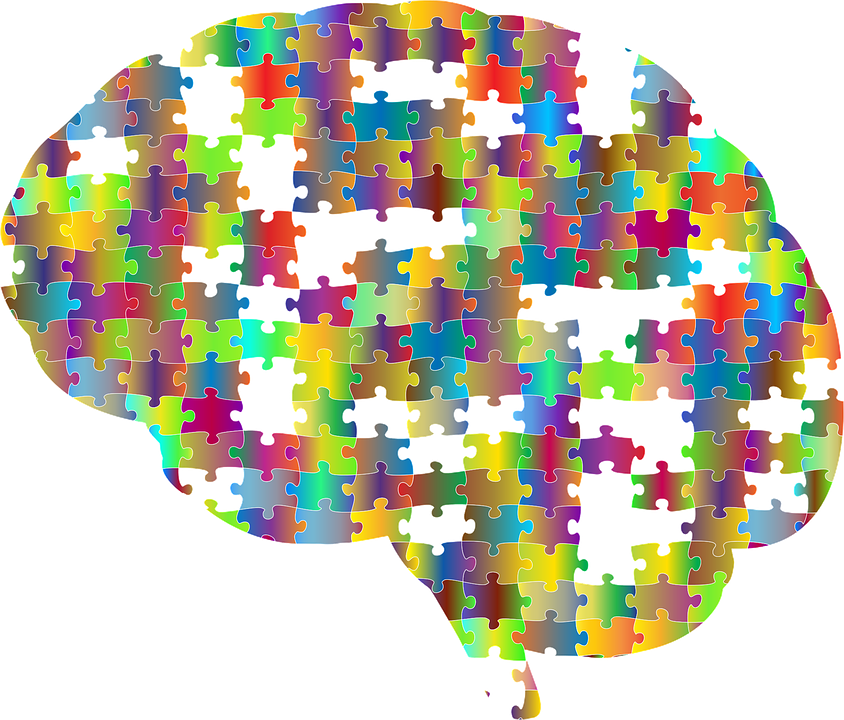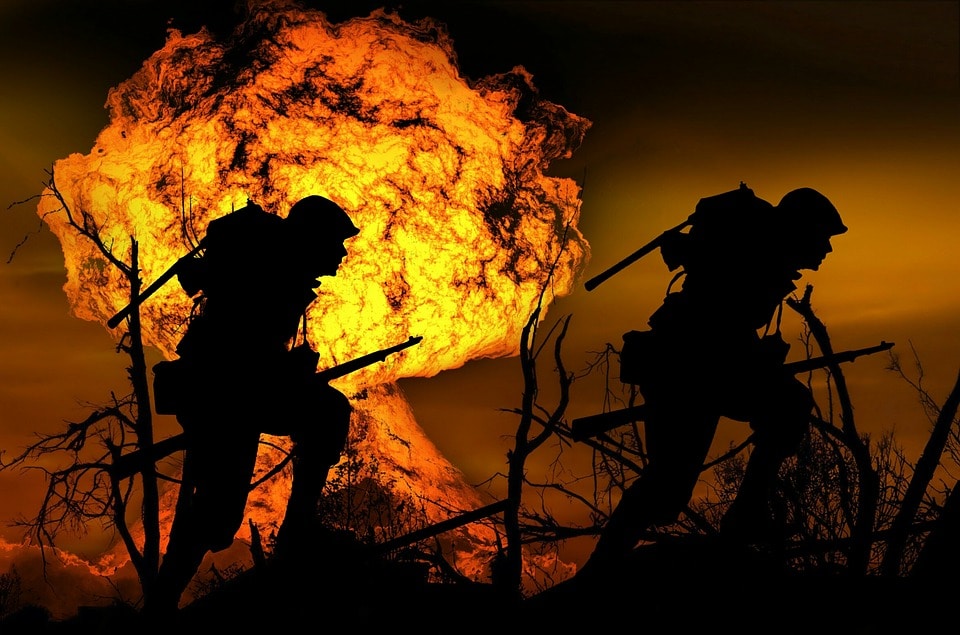Special Forces: How Ibogaine is Helping Former Special Operations Soldiers with Traumatic Brain Injury and PTSD
Posted by Wesley Thoricatha

In this continuation of our first conversation with Marcus and Amber Capone of VETS, we discuss ways that traumatic brain injury (TBI) can overlap and complicate post-traumatic stress disorder (PTSD), and how the psychedelic root bark iboga and it’s derivative ibogaine can treat both disorders. Marcus is a former SEAL Team operator who exhausted every conventional treatment for depression, PTSD and TBI before finding lasting healing with ibogaine and 5-MeO-DMT. You can read the first part of our interview with Marcus and Amber here.
Marcus and Amber, thank you again so much for speaking with us. One of the things I love about your story is that it’s the story of both of you. The majority of the time when you hear about veterans healing from PTSD, it’s all about the veteran themselves, but of course behind every vet there are families and loved ones who also carry incredible burdens.
One thing I’m curious about is how your community is responding to the work you are doing with VETS and helping people find psychedelic treatments. How do the veterans and Special Forces guys react? And Amber, how do the wives and families react?
Amber: There is an unprecedented level of trust in the SEAL community, so this has taken on a life of its own due to the growing number of guys who’ve had profoundly positive results.
That being said, at first some people can be skeptical and may say, “Oh that’s not for me.” I say to those who are hesitant, “I hope you’re never at a point where you are so desperate that you will consider anything, but if you find yourself there, we can help.” That’s where I eventually found myself… willing to consider anything to save my marriage, my husband and my family – which required me to think outside the box.
Marcus: Former Special Operations veterans I’ve worked with are all across the board when they hear about this kind of treatment. Some guys are scared to death; others are extremely excited because they’ve found out how many individuals are actually having positive outcomes. They say, “Wait there’s something out there that really works? Sign me up!” Others give it careful thought over a long period of time and try many other things before deciding to pursue this path. These treatments are not risk free, so careful consideration is necessary before making a final decision.
There are around 16 million people in the US with major depression, and close to a hundred million people worldwide. Individuals with brain injuries are spending millions of dollars on these brain clinics, and yes, a lot of people have successful results from them, but also a lot don’t get better—and it’s those individuals that are seeking out this treatment.
At the end of the day, if psychedelic-assisted therapy allows you to be a better person, be a better husband, and have a better relationship with your kids, then who’s going to argue that? Whether you have a brain injury, post-traumatic stress, or you’re depressed, or just an angry individual, these treatments work.
Amber: Marcus spent weeks at brain clinics which was so monotonous and, for him, ineffective. We were at a point where I felt like Marcus was a dead man walking. I told my parents that I believed he would be dead within two years if I left him because our family was the only stabilizing force in his life. Removing his last piece of identity and stability (us) would almost certainly push him over the edge. Whether he drank himself to death, committed suicide, or wrapped his truck around a pole from driving drunk, it just was bound to end badly. We were willing to try anything at that point because we felt that we were out of options.
Many other wives are in a similar position and don’t know what to do. It’s agonizing because you feel that you’re going to lose no matter what. I never wanted to leave Marcus, but at some point, I felt I had no other choice. There is a lot of pressure with that.
These women have already endured so much throughout their husband’s time in service. It’s unbelievably difficult… but they are also incredibly tough. I’ve tried to encourage spouses to have an open mind that these treatments could work—to give it a shot and be supportive, realizing that many of their husband’s struggles may currently be beyond his control due to TBI. If he is willing to commit to seeking treatment, clearly he wants to be better too, so this could be the beginning of something very positive!

Yeah, I’d love to hone in on the TBI element of all this, because the sound bite that most people hear is that vets come back suffering from PTSD, which then gets healed in this emotional release kind of way, particularly with MDMA-assisted psychotherapy. You guys talk a lot about TBI and how significant it was in your equation, so I’m curious if you can speak more on that.
Marcus: When we talk about head injuries, there is still a lot to be learned, especially with blast injury. I don’t believe that even the medical community fully understands how or why the various levels of severity and suffering exist. We do know, however, that TBI is the “signature injury” from OIF and OEF. We also know that other communities, particularly professional contact sports, are experiencing their own TBI epidemic. The coming years will be pivotal in understanding and addressing these increasing concerns.
Around 2008 I was getting really bad headaches and taking handfuls of ibuprofen, but I was still operating at the time. Later in 2011 or 2012, I realized something was not right. I started to get very impulsive and angry, and things were not lining up correctly. I remember talking to one of my colleagues and they strongly recommended that I seek out the SEAL psychologist; maybe he could provide me with some medicines that may help with whatever I was struggling with. So I tried this, and went through eight years of consistent SSRI use, and all kinds of other medications. Some worked for a short amount of time, some didn’t work at all, and others made me want to climb up a wall. They were just terrible. Later I went through multiple brain clinics, and the scans showed many signs of TBIs. What’s more concerning, however, is what can’t be seen on traditional imaging; the microscopic damage that isn’t yet detectable in the living.
Amber: One of the things I remember was that you went to a clinic and came back and said, “Today they found that I had trouble with memory and recollection, and balance and coordination.” And I’m like, what? You’re 38! You know, memory recollection, okay, I’ve seen that… But balance and coordination? To me, Marcus has always been this stellar athlete, the most capable human being I know… how can this be that he’s lacking balance and coordination? It wasn’t until Marcus’ friend’s brain autopsy came back showing blast injury that everything started to make sense. The other symptoms correlated, as well…
Before ibogaine, Marcus had gotten lost driving, he couldn’t remember people’s names, he would repeat things over and over, and he had horrible headaches, insomnia, rage, impulsivity, depression, vision changes, confusion, suicidality, you name it…. And his go-to coping mechanism was alcohol, which was like pouring gasoline on a fire. The ibogaine treatment worked on some deep psychological traumas, but it also it also really did a number on his brain. I’m no scientist, but I can tell you that something physiologically changed in his brain. For me, the most exciting thing that came out of Marcus’ ibogaine treatment was the return of his cognitive functioning. Obviously much more research needs to be done to support our observation of this, which we hope to raise funding for in the future. The other significant benefit was the cessation of his drinking, which has lasted for over two years now.
Marcus, you mentioned in our first interview that you had never done cannabis or any psychedelic before your ibogaine treatment. Ibogaine is a “big daddy” of a drug, and is known for sometimes being an extremely intense ordeal of a journey. What was your experience like under the effects of this entheogen?
Marcus: I’ve never had an ayahuasca treatment, but I’ve heard from others about how it can comfort you, and provide you with an easier journey to whatever you’re seeking. Ibogaine just backhands you. It’s a Mack truck running you over again and again; it’s like going to hell and back. Everyone’s experience is different, but for the majority of people, the deeper the hurt you’re dealing with, the harder the experience is going to be. It’s laughable that as a Schedule 1 drug in the US, Ibogaine is considered to have a “high likelihood for abuse”. Ibogaine is the most non-recreational medicine, and I can’t think of anyone in their right mind would ever want to use Ibogaine recreationally. I’d rather do just about anything than have another Ibogaine treatment.
When you have deep-rooted trauma and throw in some mild traumatic brain injury on top of it with a bunch of other war trauma and bad shit that’s happening in your life, it’s a recipe for an excruciating journey. I dealt with some shit that I really didn’t want to deal with again. Past emotions hanging out in my subconscious that were affecting my relationships with my wife, my kids, my friends and my parents. I dealt with them during this ibogaine experience because that’s exactly what the medicine does. During the Ibogaine experience, a psychotherapist sits at your side throughout the journey. Their job is to help create space and bring those deep-rooted traumas and hurts to the surface so they can be dealt with once and for all.

Regardless of the type or extent of these traumatic experiences, you’re probably going to deal with them on ibogaine for eight or ten or twelve hours. I mean, how bad does it suck that you have to relive these experiences again? But it’s a critical component to the healing.
Ibogaine is one of the hardest experiences I’ve ever been through. Many psychedelic-assisted therapy experiences are similarly described this way; but I feel they are likely some of the best therapies for veterans, and especially my teammates, because in order to truly deal the bad, dark trauma, you have to face the darkness that is impeding your livelihood head on. You need to go deep, and ibogaine takes you down. I mean, it takes you all the way down and then it brings you back. You come out of the experience feeling like, “Wow, there’s hope, and you know what? Life is not that bad.”
Think of an Ibogaine experience as a heavy backpack weighted down with rocks, and as your journey plays out in front of you literally like a movie, you face these demons; the backpack gets lighter because the rocks are being dumped out. It truly sets you free. Sometimes you’re crying, sometimes you’re screaming, but at the end you’re like, “Holy shit, I’m good! I feel great!” When Amber walked in after my experience was over, she just said this glow was around me, and it was like, “Oh wow, Marcus is back!”
Amber: It was crazy! When I walked into the room, I felt like it was as if we were in college again. His countenance was different, his eyes were different, his whole energy was different. I was in complete shock!
Marcus: I don’t want to confuse people and make everyone think that by taking a pill, one time, will cure them forever, though for many, including myself, Ibogaine and the 5-MEO combination can be the most profound experience of their lives. My coach/therapist reiterates to me on a regular basis, “Marcus, you’re going to have to deal with this deep-rooted crap, and put in the daily work to continue to get better. She’s says, “Your job is to now go help ten thousand others, or a hundred thousand, or a million other people. You’ve been cursed with the darkness, but you are now blessed with the light, and you have the ability to help save many others.” And I think what Amber and I are doing with VETS is right on par with that; it’s the coolest and most humbling thing imaginable.
Amber: This is a bigger movement than just Marcus and me; there’s something very special happening in the veteran community, and quite honestly, in our world. It’s exciting that there’s so much momentum behind psychedelic research, and that much of it is focused on treating and helping veterans. It also doesn’t end with the veteran… this impacts marriages, families, and generations to come.
Healing is happening on physiological, psychological, and spiritual levels… bondages are being broken, lives are being saved, and families are being reunited. It’s absolutely the most incredible thing we’ve ever been a part of; giving back to this amazing community that has given us so much is humbling beyond words, and is proving to be worth every day of struggle we endured.
We are very grateful to Amber and Marcus for sharing their story with us. You can read our first interview with them here. To support their nonprofit VETS, click here to donate.
